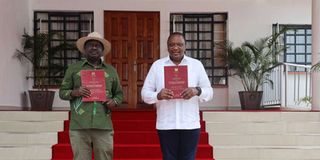Public interest is paramount in all national projects

President Uhuru Kenyatta and former Prime Minister with copies of the BBI report during its presentation at the Kisii State Lodge in October 2020.
What you need to know:
- Failure to conduct public participation has proven economically costly.
- Our struggle and clamour for a new Constitution in 2010 was inspired by our vision of a democratic alternative.
The BBI judgment stopped reggae in the interim. The now famous BBI judgment has got all and sundry commenting about the soundness or otherwise of the High Court verdict. My illuminor from the judgment is the power of public participation. It was the judges holding that the steering committee did not produce and distribute adequate copies of the Constitution of Kenya (Amendment Bill) 2020 to facilitate public participation.
The Administrative Procedures adopted by the Independent Electoral and Boundaries Commission on verification of signatures were also declared illegal for lack of public participation. Potently, the court adjudged that any amendment to the basic structure to the Constitution accords with constitutionalism only when preceded by civic education and public participation.
Involve, inform, explain and adopt or give reasons for non-adoption of Wanjiku’s concerns in all legal processes affecting her were the echoes from the court. She matters and fundamentally so. She is the landlord born and raised by the people of Kenya who turned out to vote for a new Constitution in 2010.
It was not enough as it were to tweet or upload contents of a proposed law or policy in a website and leave it to those who care to scavenge for it. The ordinary Kenyan must get the text and letter of any constitutional proposal in a language that they understand. She must be given adequate time to go through the proposal and provide feedback.
The venue of where to conduct public participation and even its format and procedure must be tailored to the specific conditionalities of a given class of people. Having the BBI Bill in the internet was inadequate due to connectivity and even the need to access it through an electronic gadget.
Social contract
Our Constitution has created the notion of a people’s assembly. They have the power to ratify or decline proposals from those acting in pursuance of a constitutional imperative such as an amendment of the Constitution. The fundamental tenet of public participation rests on the social contract and the public value theorems. It is the social contract theory that talks about a conditional agreement between the governed and the governor.
The condition being governance in accord with the law. Public value theory in support of public participation postulates that anything done under the sun must be in line with public interest being what the people would ‘choose if they saw clearly, thought rationally, and acted disinterestedly and benevolently’.
Failure to conduct public participation has proven economically costly. Cases abound, including the declaration of various Acts of Parliament as unconstitutional and the transfer of the Kenya Meat Commission to the Kenya Defence Forces. All these in disregard of the law costs the tax payer. It matters to get the legal economics right for public money must be spent prudently.
Our struggle and clamour for a new Constitution in 2010 was inspired by our vision of a democratic alternative as opposed to a system based on an institutionalised imprudent use of public resources. One of its basic tenets is the gift of public participation and we as a people must defend it to death as a matter of law and basic economics.
Mr Kipkorir is a legal researcher. [email protected]





